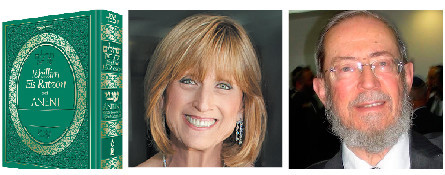Tehillim Eis Ratzon and Aneni: Zichron Yocheved
One of America’s premier Jewish publishers, Feldheim Publishers, recently reissued, in a revised edition, its famed “Tehillim Eis Ratzon and Aneni: Zichron Yocheved,” all in one volume, with an English translation by Rabbi Yaakov Yosef Iskowitz.
This revised edition was edited by the renowned Rabbi Emanuel Feldman, former editor of “Tradition: The Journal of Orthodox Jewish Thought,” and sponsored by the family of Yocheved Orbach of blessed memory, whose father, Leo Schlusselberg of blessed memory, was one of Prime Minister David Ben Gurion’s chief security officers in the early years of the state.
In his introduction, Rabbi Iskowitz teaches us the following concerning the importance of tehillim in the Jewish liturgical tradition:
“Many psalms are found in the siddur, our daily prayer book. An increasing number of us also complete the entire Book of Psalms on a weekly or monthly basis. In addition, many people recite pertinent psalms for health, sustenance, for the benefit of the deceased, or for countless personal needs. While these are worthy reasons, we ought to bear in mind that the plain meaning of tehillim is ‘praises.’ Do we remember to sing G-d’s praises for the good He bestows on us?
“Furthermore, since we are eternally indebted to G-d, we need not wait for a special occasion in order to praise Him. Indeed, the very root of our very name, Yehudi — Jew — means ‘to give thanks.’ In the words of the psalmist [109:30], ‘I will thank the Eternal exceedingly … and … praise Him.”
Further on, Rabbi Iskowitz informs us of the following:
“No translation is able to capture all nuances of the original text, let alone the subtleties and profundities inherent in its sacred and prophetic words. This volume is meant to present the simple meaning of the psalms. … We have spared no effort in rendering the original into an English that is inspiring and suitable to sincere prayer.”
Rabbi Iskowitz comes to this literary effort with an interesting and varied background.
Born in Pittsburgh in 1941, he attended Yeshiva Torah Vodaath, the University of Pittsburgh, Yeshivat Mercaz HaRav, and Yeshiva University, where he earned a masters in Jewish history and semicha from the Rav at RIETS in 1968.
From 1968 to 1988 he served as a U.S. Army chaplain with tours of duty at Fort Hamilton in Brooklyn, Ft. Leonard Wood in Missouri, Seoul in South Korea, Stuttgart and Frankfurt in Germany with Noach Lanter of North Woodmere, at Ft. Carson in Colorado and Ft. Monmouth in New Jersey. He retired in 1988 with the rank of Lieutenant Colonel.
After moving to Israel in 1988, Rabbi Iskowitz served our people in the following varied capacities: instructor at Yeshiva Ohr Samayach; editor at the Talmudic Encyclopedia, English edition; translator for Feldheim Publishers; lecturer at the OU Center in Jerusalem; and chaplain, U.S. Jewish War Veterans in Jerusalem.
Given the importance of Tehillim, the Book of Psalms, in the Jewish liturgical tradition, any new English rendition of high quality and religious integrity — as this book is — becomes a welcome contribution to our religious needs.
One last word: It should be noted that there are two local connections related to this new work. First, the translator’s brother, Rabbi Barry Iskowitz, a musmach of Rav Gustman, zt”l, is a resident of Cedarhurst, New York and a member of the Red Shul and the Island Avenue Shul.
Also, the noted pediatrician, Dr. Moshe Schlusselberg of Woodmere, a member of the Young Israel of Woodmere, is the younger brother to Yocheved, a”h, after whom this work is dedicated.
FOR FURTHER STUDY
The latest volume in the “Mesoras HaRav series, Sefer Bamidbar,” published by the OU Press, is finally available at all local bookstores. This English commentary, drawn from various works by Rav Joseph B. Soloveitchik, zt”l, was edited by Dr. Arnold Lustiger who sought out many relevant commentaries by the Rav from previously unpublished manuscripts, lectures, and reliable notes and reports of the Rav’s thoughts and commentaries.
This work joins others in this series including the Rav’s Siddur, the Birkon, the Kinot, and other previous sefarim in the Chumash series. For more information on this series and related writings, see “A Chumash For All Times” by Rabbi Gil Student (bit.ly/2sPBSXX).

 46.0°,
Light Drizzle
46.0°,
Light Drizzle 




